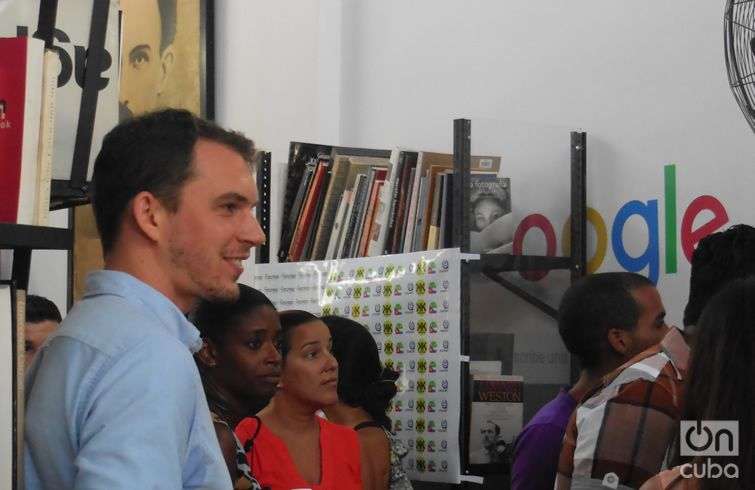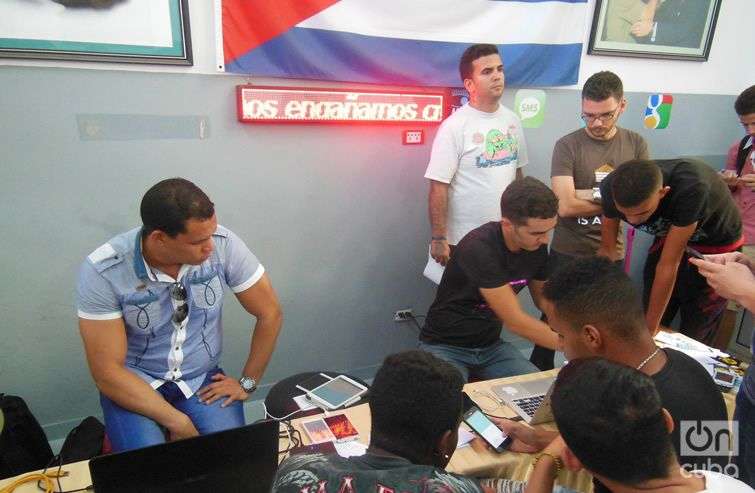Lester even went to the “Laboratory of Art” run by artist Alexis Leyva “Kcho” in search of a solution for his mobile phone. Through the blog TuAndroid he learned about the first official technology event on the Android operating system in Cuba.
Last Sunday afternoon the computing community in the state and private sectors working with Android devices gathered together to present their individual experiences, under the slogan “For a technological culture accessible to all.” But what mobilised the public the most was the announcement of the visit of Phillip Oertel, an engineer at Google Play (Android app store).
Phillip Oertel led several efforts to measure and reduce latency for users with connections low bandwidth. Precisely what is needed in Cuba. According to event organisers, Oertel is currently working on a project called Instant Android Apps, with the goal of making applications as ubiquitous as electricity.

Oertel was able to witness the great community in Cuba, mostly young people who work in different ways to create App for Android devices in Cuba. But as he entered the room, he had to leave because the Google engineer needed a special license authorising such an exchange of technological information and application development with the Cubans.
The intention to seek another opportunity to resume the meeting with Oertel was left hanging. “We will fight to get involved as an authority and make the exchange with Cuba application developers happen,” said Leysi Rubio, one of the meeting’s organisers.

The host, Kcho, encouraged those who try to improve the functionality of mobile devices every day. “This is a space of sovereignty and freedom, which shows the daily struggle against the blockade. I am sure that with these alternative ways of dealing with the limitations show that they will never slow down, and that there is a group of young people working for the prosperity and sustainability of Cuba,” said plastic artist.

TuAndroid, which “is not a blog, is a family,” as described by the event’s organisers, was founded on December 17, 2014, and is a space for promotion and distribution of information on this operating system.
At the meeting the experiences of the following groups were also presented: EnTuMovil, a pioneer of mobile services in Cuba; Qvacall, with its multiple functions; Android Community UCI, with the institutional experience; Ultracell, mobile workshops, the most common problems; RutaHabana transport What serves me? and SIEM, with RenC’s proposal.
One of the presentations that touched the guests was that of Mandy, Ultracell technicians. This workshop began in 2014 with a more modest structure, but eventually expanded to have three offices, one in 23 and 8 Vedado, one in 41 and 42 in Playa and Obispo 411. The aim of the technicians in this business it is that the client always finds a solution to their problem.
“We have become a large network our workshops, various venues respond to the same idea so you’ll find the same service in any of them. We make the latest technology and accessories available to customers, and when we have not managed to get hold of the latest model of the Smart Phone that went on sale, we have a demo model, similar in design and weight; because Ultracell never says no,” said Mandy.

There are many workshops like this in Cuba, arising from the demands of users that ETECSA cannot meet.
Havana route (Ruta Habana) was another application that has found public acceptance. Created by Pablo Ernesto Miró as an application of his graduation thesis in Computer Science from the University of Computer Sciences (UCI), has the capital’s local bus routes.
The application suggests routes to shorten the distances of each journey, provides information of all stops that have a bus and the fare according to the route for each mode of transport, among other facilities.
Pablo created Havana route thinking about every detail, because of that information can be found in Spanish, English, and a new version in French is now being prepared. But not everything was rosy.
“When I was creating the database I limited access to information, the Ministry of Transport refused to surrender routes, directions and stops that the buses must have. The data I have on my app was collected with the help of my friends.” Said the programmer.
Computer Union of Cuba (UIC), with a presentation by its president Ailyn Febles, left the door open for young people like those who attended the Android event to integrate and achieve a greater organisation in their work.
“What we want is to bring together professionals from the communications sector to try to achieve better contributions to the computerisation of the society in which we all live,” Ailyn said.
The UIC, created on March 7 last under the mission of “Innovate, Integrate, Computerise” has 8,000 members of a platform that seeks a space of social and technical exchange, so that the academic, public, and state sectors talk.
“We want to serve as a bridge for the certification of alternative production necessary for the operation of a digital society, so we will try to represent people who naturally carry out such work. One of the main challenges is to ensure that members of the UIC have preference for services requested in the technology industry, they could be better prices in private workshops, the best deals with ETECSA with Desoft, so that professionals in the sector are favoured in the use of technology,” its president confessed.
One of the agreements of this first meeting of the Android community in Cuba was creating favourable ecosystems and databases useful for the development of various applications, with the aim of shortening production times. Attendees were able to copy the packages of applications made by Cuban computer technicians despite the daily constraints they face.











English translation bit: the UCI is the University of Informatic Sciences and they study Informatics which is a different career than Computer Science which is studied at Havana University.